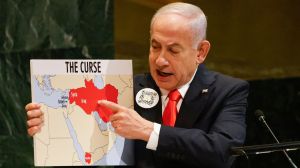Ritu Sarin is Executive Editor (News and Investigations) at The Indian Express group. Her areas of specialisation include internal security, money laundering and corruption. Sarin is one of India’s most renowned reporters and has a career in journalism of over four decades. She is a member of the International Consortium of Investigative Journalists (ICIJ) since 1999 and since early 2023, a member of its Board of Directors. She has also been a founder member of the ICIJ Network Committee (INC). She has, to begin with, alone, and later led teams which have worked on ICIJ’s Offshore Leaks, Swiss Leaks, the Pulitzer Prize winning Panama Papers, Paradise Papers, Implant Files, Fincen Files, Pandora Papers, the Uber Files and Deforestation Inc. She has conducted investigative journalism workshops and addressed investigative journalism conferences with a specialisation on collaborative journalism in several countries. ... Read More
What the CBI won’t say: how Law, DoPT armtwisted on Bofors
Now it’s the CBI’s turn to come to the aid of a beleaguered Law Ministry and the Department of Personnel and Training (DoPT). Thes...

Now it’s the CBI’s turn to come to the aid of a beleaguered Law Ministry and the Department of Personnel and Training (DoPT). These are two Ministries which, within an interval of two days in November last year, turned down two crucial requests from the agency in the Bofors case.
While joint director A K Majumdar said today that it was “purely” the CBI’s decision to send Additional Solicitor General B Dutta to London—and that “neither ministry had any role to play” in the January 11 order de-freezing Ottavio Quattrocchi’s two accounts—he brushed several facts under the carpet. Facts which will now come under the Supreme Court scanner:
• The CBI had asked that an agency official and a law officer should go to London. This was overruled by the DoPT on November 26 last year—two weeks before director U S Mishra was to demit office—which said that only Law Ministry’s Dutta would go.
• Dutta is the same law officer who earlier last year disagreed with the CBI on how to handle the issue of frozen funds and the legal course of action. He had said that the agency has “no justification” blocking the funds.
• Defreezing of the accounts, top officials say, never figured in either Dutta’s briefings with the CBI prior to his visit or in his report on the visit submitted to the agency on December 27.
• The brief Dutta took to London was merely the status of court judgments (delivered by Justice J D Kapoor and Justice R S Sodhi) in the Bofors case as well as orders of the Kuala Lumpur courts turing down Quattrocchi’s extradition request. Dutta’s report to CBI also dealt with only these points.
• Just over one month before Dutta was sent on the Quattrocchi mission, another ASG, K P Pathak, filed a 15-page opinion on the basis of which the Law Ministry decided not to file a review petition in the principal case against the Hinduja brothers.
This despite the fact that then CBI Director U S Mishra had filed a request to the Law Ministry to file a Special Leave Petition (SLP) challenging the May 31, 2005 High Court order passed by Justice R S Sodhi. The request was turned down, the CBI was informed of this on November 28.
• Earlier, it was the CBI’s Director of Prosecution, S K Sharma, a Law Ministry official posted in the CBI, who wrote that would be a ‘‘travesty of justice’’ if the CBI appealed against the Sodhi judgment.
• CBI Director Vijay Shankar also said it would be “misplaced to involve the Law Minister in the Quattrocchi matter” and defreezing was in the CBI’s domain, he confirmed to The Indian Express that Quattrocchi was a “Bofors accused” and the agency was working on his extradition from Italy and a fresh Letter Rogatory to Switzerland from where the Rs 21 crore was remitted to the two UK accounts.
The CBI, sources said, was informed about the defreezing order via e-mail on January 12. “While we knew we do not have clinching evidence to link the Bofors pay-offs to the frozen funds, we were taken aback at how quickly the defreezing order was passed,’’ a top CBI official said.
The CBI has today asked the CPS for a formal copy of the London High Court order and informed them that they now have a notice from the Indian Supreme Court on the question of defreezing of Quattrocchi’s bank accounts.
Significantly, while Dutta travelled to London on December 22, exactly two months before that, on October 22, the agency was served a notice by the Supreme Court on the basis of a PIL challenging the move not to go for revision against Justice Sodhi’s High Court order.







- 01
- 02
- 03
- 04
- 05

























